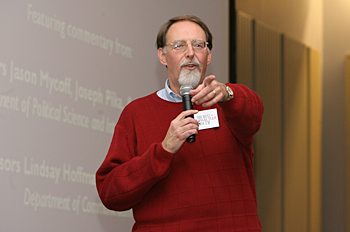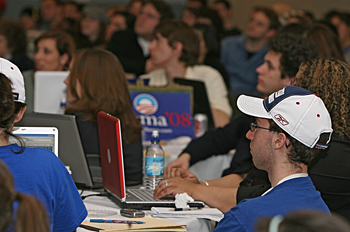Attendees had the chance to listen to explanations of the Democratic and Republican presidential primaries, as well as analysis of the campaigns and political media communication, from experts in the departments of Political Science and International Relations and Communication. Throughout the evening, several televisions were tuned to different news stations so that attendees could stay abreast of the latest predictions and results in the primary elections.
David Wilson, assistant professor of Black American Studies and of political science and international relations, opened the presentations with an explanation of surveys and opinion polls. He explained the importance of considering the margin of error and the potential inaccuracies in exit polls.
Jason Mycoff continued the formal discussion with an explanation of the timing of the primary elections from state to state. Mycoff, an assistant professor of political science and international relations, teaches American politics and research methods. He explained to the crowd that “calendar envy” is the reason behind our currently front-loaded election calendar. Many states were unhappy with holding their primaries later than Iowa and New Hampshire, which traditionally vote first. States are now holding their primaries earlier and earlier every election.
Joseph Pika, professor of political science and international relations, discussed the question of winning and victory in the primary elections. Winning can be determined in terms of popular votes, or delegates won. Both the Democratic and the Republican parties operate under a complex set of rules for determining which candidate will receive the formal presidential nomination.
Lindsay Hoffman, assistant professor of communication, discussed voting trends over time. Her research of the effects of gender, race, religion and age on voting tendencies revealed to the crowd some interesting patterns. One such pattern was the early support among African Americans for Hillary Clinton, which tapered off after the Iowa primary and led to a large jump in support for Barack Obama. “Sometimes it comes down to how well a campaign is run and what is actually being said in the media,” Hoffman said.

According to her analysis, thus far in the 2008 campaign, by far the most media attention has gone to candidates' strategies (e.g. fundraising, polls), followed by coverage of the candidates' personal lives (e.g. relationships, health), and then there is some issue coverage in the mix. Research is showing, however, that the average voter would appreciate more issue coverage in order to make an informed decision at the polls, Young said.
To get a more complete picture of the candidates, Young suggests that voters consult multiple media sources as well as be critical consumers of the messages that are presented. “If we could make sure that somewhere in there we focus on the issues, we'll all be a little better off,” she said.
Following the formal discussion portion of the evening, there was lively discussion amongst attendees and the panelists. Many attendees stayed for several hours to watch as the primary results came in from various states.
Story by Crystal Buck
Photos by Kathy Atkinson


